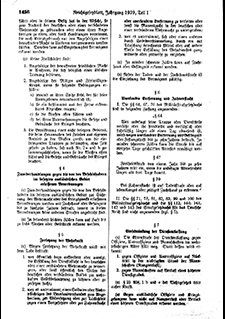Radicalization of the Persecution of Opposition
Whereas the Nazi regime attempted to secure the loyalty of “Aryan Germans” by minimizing burdens caused by the war on the one hand, it stepped up its system of police persecution on the other. The outward appearance of a loyal “Volksgemeinschaft” was offset by increasing terror against dissidents and undesired minorities.
The wartime situation created new opportunities and a type of guise to justify taking harsher action against dissidents and persecuting Jews, Sinti and Roma as well as people with disabilities. Military attacks were met inside the German “warrior community” by a radicalization of the persecution of so-called “community aliens”. More and more groups of society and even “Aryan” members of the populace were increasingly subjected to scrutiny.
Special wartime criminal law had already been introduced at the end of August 1939. Among other things, it introduced new, vague offenses such as “undermining the war effort”, which were punishable even with death. Anyone who listened to enemy broadcasts or voiced criticism about the war was now liable for prosecution. Special courts and the newly established Reich Main Security Office were central instruments for the surveillance and repression of fellow citizens.
Source / title
- Public domain

